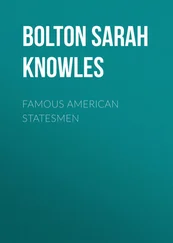Sarah Bolton - Famous Givers and Their Gifts
Здесь есть возможность читать онлайн «Sarah Bolton - Famous Givers and Their Gifts» — ознакомительный отрывок электронной книги совершенно бесплатно, а после прочтения отрывка купить полную версию. В некоторых случаях можно слушать аудио, скачать через торрент в формате fb2 и присутствует краткое содержание. Жанр: foreign_antique, foreign_prose, на английском языке. Описание произведения, (предисловие) а так же отзывы посетителей доступны на портале библиотеки ЛибКат.
- Название:Famous Givers and Their Gifts
- Автор:
- Жанр:
- Год:неизвестен
- ISBN:нет данных
- Рейтинг книги:4 / 5. Голосов: 1
-
Избранное:Добавить в избранное
- Отзывы:
-
Ваша оценка:
- 80
- 1
- 2
- 3
- 4
- 5
Famous Givers and Their Gifts: краткое содержание, описание и аннотация
Предлагаем к чтению аннотацию, описание, краткое содержание или предисловие (зависит от того, что написал сам автор книги «Famous Givers and Their Gifts»). Если вы не нашли необходимую информацию о книге — напишите в комментариях, мы постараемся отыскать её.
Famous Givers and Their Gifts — читать онлайн ознакомительный отрывок
Ниже представлен текст книги, разбитый по страницам. Система сохранения места последней прочитанной страницы, позволяет с удобством читать онлайн бесплатно книгу «Famous Givers and Their Gifts», без необходимости каждый раз заново искать на чём Вы остановились. Поставьте закладку, и сможете в любой момент перейти на страницу, на которой закончили чтение.
Интервал:
Закладка:
For many years the Lowell Institute has furnished instruction in science to the school-teachers of Boston. It now furnishes lectures on practical and scientific subjects to workingmen, under the auspices of the Wells Memorial Workingmen's Institute.
As the University Extension Lectures carry the college to the people, so more and more the Lowell fund is carrying helpful and practical intelligence to every nook and corner of a great city. Young people are stimulated to endeavor, encouraged to save time in which to gain knowledge, and to become useful and honorable citizens. When more "Settlements" are established in all the waste places, we shall have so many the more centres for the diffusion of intellectual and moral aid.
Who shall estimate the power and value of such a gift to the people as that of John Lowell, Jr.? The Hon. Edward Everett said truly, "It will be, from generation to generation, a perennial source of public good, – a dispensation of sound science, of useful knowledge, of truth in its most important associations with the destiny of man. These are blessings which cannot die. They will abide when the sands of the desert shall have covered what they have hitherto spared of the Egyptian temples; and they will render the name of Lowell in all-wise and moral estimation more truly illustrious than that of any Pharaoh engraven on their walls."
The gift of John Lowell, Jr., has resulted in other good work besides the public lectures. In 1850 a free drawing-school was established in Marlboro Chapel, and continued successfully for twenty-nine years, till the building was taken for business purposes. The pupils were required to draw from real objects only, through the whole course. In 1872 the Lowell School of Practical Design, for the purpose of promoting Industrial Art in the United States, was established, and the Massachusetts Institute of Technology assumed the responsibility of conducting it. The Lowell Institute bears the expenses of the school, and tuition is free to all pupils.
There is a drawing-room and a weaving-room, though applicants must be able to draw from nature before they enter. In the weaving-room are two fancy chain-looms for dress-goods, three fancy chain-looms for woollen cassimeres, one gingham loom, and one Jacquard loom. Samples of brocaded silk, ribbons, alpacas, and fancy woollen goods are constantly provided for the school from Paris and elsewhere.
The course of study requires three years; and students are taught the art of designing, and making patterns from prints, ginghams, delaines, silks, laces, paper-hangings, carpets, oilcloths, etc. They can also weave their designs into actual fabrics of commercial sizes of every variety of material. The school has proved a most helpful and beneficent institution. It is an inspiration to visit it, and see the happy and earnest faces of the young workers, fitting themselves for useful positions in life.
The Lowell Institute has been fortunate in its management. Mr. John Amory Lowell was the able trustee for more than forty years; and the present trustee, Mr. Augustus Lowell, like his father, has the great work much at heart. Dr. Benjamin E. Cotting, the curator from the formation of the Institute, a period of more than half a century, has won universal esteem for his ability, as also for his extreme courtesy and kindness.
John Lowell, Jr., humanly speaking, died before his lifework was scarcely begun. The studious, modest boy, the thorough, conscientious man, planning a journey to Africa and India, not for pleasure merely, but for helpfulness to science and humanity, died just as he entered the long sought-for land. A man of warm affections, he went out from a broken home to die among strangers.
He was so careful of his moments that, says Mr. Everett, "he spared no time for the frivolous pleasures of youth; less, perhaps, than his health required for its innocent relaxations, and for exercise." Whether or not he realized that the time was short, he accomplished more in his brief thirty-seven years than many men in fourscore and ten. It would have been easy to spend two hundred and fifty thousand dollars in houses and lands, in fine equipage and social festivities; but Mr. Lowell had a higher purpose in life.
After five weeks of illness, thousands of miles from all who were dear to him, on the ruins of Thebes, in an Arab village built on the remains of an ancient palace, Mr. Lowell penned these words: "As the most certain and the most important part of true philosophy appears to me to be that which shows the connection between God's revelations and the knowledge of good and evil implanted by him in our nature, I wish a course of lectures to be given on natural religion, showing its conformity to that of our Saviour.
"For the more perfect demonstration of the truth of those moral and religious precepts, by which alone, as I believe, men can be secure of happiness in this world and that to come, I wish a course of lectures to be delivered on the historical and internal evidences in favor of Christianity. I wish all disputed points of faith and ceremony to be avoided, and the attention of the lecturers to be directed to the moral doctrines of the Gospel, stating their opinion, if they will, but not engaging in controversy, even on the subject of the penalty for disobedience. As the prosperity of my native land, New England, which is sterile and unproductive, must depend hereafter, as it has heretofore depended, first on the moral qualities, and second on the intelligence and information of its inhabitants, I am desirous of trying to contribute towards this second object also."
The friend of the people, Mr. Lowell desired that they should learn from the greatest minds of the age without expense to themselves. It should be an absolutely free gift.
The words from the Theban ruins have had their ever broadening influence through half a century. What shall be the result for good many centuries from now? Tens of thousands of fortunes have been and will be spent for self, and the names of the owners will be forgotten. John Lowell, Jr., did not live for himself, and his name will be remembered.
Others in this country have adopted somewhat Mr. Lowell's plan of giving. The Hon. Oakes Ames, the great shovel manufacturer, member of Congress for ten years, and builder of the Union Pacific Railroad, left at his death, May 8, 1873, a fund of fifty thousand dollars "for the benefit of the school children of North Easton, Mass." The income is thirty-five hundred dollars a year, part of which is used in furnishing magazines to children – each family having children in the schools is supplied with some magazine; part for an industrial school where they are taught the use of tools; and part for free lectures yearly to the school children, adults also having the benefit of them. Thirty or more lectures are given each winter upon interesting and profitable subjects by able lecturers.
Some of the subjects already discussed are as follows: The Great Yellowstone Park, A Journey among the Planets, The Chemistry of a Match, Paris, its Gardens and Palaces, A Basket of Charcoal, Tobacco and Liquors, Battle of Gettysburg, The Story of the Jeannette, Palestine, Electricity, Picturesque Mexico, The Sponge and Starfish, Sweden, Physiology, History of a Steam-Engine, Heroes and Historic Places of the Revolution, The Four Napoleons, The World's Fair, The Civil War, and others.
What better way to spend an evening than in listening to such lectures? What better way to use one's money than in laying the foundation of intelligent and good citizenship in childhood and youth?
The press of North Easton says, "The influence and educational power of such a series of lectures and course of instruction in a community cannot be measured or properly gauged. From these lectures a stream of knowledge has gone out which, we believe, will bear fruit in the future for the good of the community. Of the many good things which have come from the liberality of Mr. Ames, this, we believe, has been the most potent for good of any."
Читать дальшеИнтервал:
Закладка:
Похожие книги на «Famous Givers and Their Gifts»
Представляем Вашему вниманию похожие книги на «Famous Givers and Their Gifts» списком для выбора. Мы отобрали схожую по названию и смыслу литературу в надежде предоставить читателям больше вариантов отыскать новые, интересные, ещё непрочитанные произведения.
Обсуждение, отзывы о книге «Famous Givers and Their Gifts» и просто собственные мнения читателей. Оставьте ваши комментарии, напишите, что Вы думаете о произведении, его смысле или главных героях. Укажите что конкретно понравилось, а что нет, и почему Вы так считаете.












